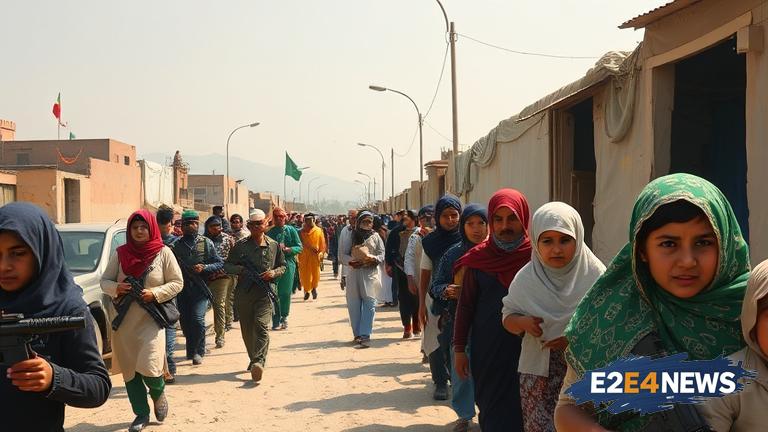Pakistan has resumed the forced repatriation of Afghan refugees, a move that has been met with widespread criticism from human rights groups and international organizations. The decision to restart the repatriation process has been driven by Pakistan’s desire to reduce the number of refugees in the country, which has been hosting millions of Afghans for decades. However, the move has raised concerns over the safety and well-being of the refugees, who are being forced to return to a country still reeling from conflict and instability. The Afghan refugee crisis is one of the longest-running and most complex in the world, with millions of people displaced by decades of war and violence. Pakistan has been a key host country for Afghan refugees, providing shelter and assistance to those fleeing the conflict. However, in recent years, the Pakistani government has faced increasing pressure to reduce the number of refugees in the country, with some officials citing security concerns and economic burdens. The forced repatriation of Afghan refugees has been a contentious issue, with many arguing that it is a violation of human rights and international law. The United Nations High Commissioner for Refugees (UNHCR) has expressed concerns over the move, citing the lack of safety and security in Afghanistan and the potential for refugees to face persecution and violence upon return. Despite these concerns, the Pakistani government has pushed ahead with the repatriation process, with thousands of refugees already being forced to return to Afghanistan. The move has been met with widespread criticism from human rights groups, who argue that the forced repatriation of refugees is a breach of international law and a violation of human rights. The Afghan government has also expressed concerns over the move, citing the lack of infrastructure and resources to support the returning refugees. The international community has been urged to take action to address the crisis, with many calling for increased support and assistance for Afghan refugees. The situation is further complicated by the ongoing conflict in Afghanistan, which has resulted in widespread displacement and human suffering. The Taliban’s takeover of the country in 2021 has led to a significant increase in human rights abuses and violence, making it even more difficult for refugees to return safely. The forced repatriation of Afghan refugees has also raised concerns over regional stability, with many arguing that it could exacerbate tensions between Pakistan and Afghanistan. The move has been seen as a further escalation of the crisis, with many fearing that it could lead to increased violence and instability in the region. The Pakistani government has defended its decision to restart the repatriation process, citing the need to reduce the number of refugees in the country and to address security concerns. However, the move has been widely criticized, with many arguing that it is a short-sighted and inhumane decision that will only serve to exacerbate the crisis. The international community must take immediate action to address the crisis, including providing increased support and assistance to Afghan refugees and working to find a long-term solution to the crisis. The situation is a stark reminder of the need for a comprehensive and sustainable solution to the Afghan refugee crisis, one that prioritizes the safety and well-being of refugees and addresses the root causes of the conflict. The forced repatriation of Afghan refugees is a complex and multifaceted issue, one that requires a nuanced and thoughtful approach. It is imperative that the international community works together to find a solution that prioritizes the human rights and dignity of refugees, while also addressing the security and economic concerns of host countries. The crisis is a stark reminder of the need for increased cooperation and coordination between governments, international organizations, and civil society to address the root causes of the conflict and to find a lasting solution to the crisis. The situation is a call to action for the international community, one that requires immediate attention and response to address the humanitarian needs of Afghan refugees and to find a sustainable solution to the crisis.





